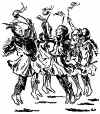Lord Baden-Powell
Hints to Instructors
In all games and competitions it should be arranged, as far as possible, that all the scouts should take part, because we do not want to have merely one or two brilliant performers and the others no use at all. All ought to get practice, and all ought to be pretty good. In competitions where there are enough entries to make beats, ties should be run off by losers instead of the usual system of by winners, and the game should be to find out which are the worst instead of which are the best. Good men will strive just as hard not to be worst as they would to gain a prize, and this form of competition gives the bad man most practice.
Scout War Songs
The Scout's Chorus (Eengonyama). This is a chant that the African Zulus used to sing to their Chief. It may be shouted on the march, or used as applause at games and meetings and camp fires. It must be sung exactly in time [See "Scout War Dance," below]
To hear the tune below, enable your computer's sound system and click your browser's "refresh" button.

Leader: Eengonyama—gonyama.
Chorus: Invooboo. Ya-Boh! Ya-Boh! Invooboo!
The meaning is:
Leader: "He is a lion!"
Chorus: "Yes! he is better than that; he is a hippopotamus!"
The Scout's Rally

To be shouted as a salute, or in a game, or at any other
appropriate time.
Leader: Be Prepared!
Chorus: Zing-a-Zing! Bom! Bom!
(Stamp or bang something at the "Bom! Bom!")
The Scout's Call

For Scout to whistle to attract attention of another Scout.
Scout War Dance
Scouts form up in one line with leader in front, each holding his staff in the right hand, and his left on the next man's shoulder.
Leader sings the Eengonyama song. Scouts sing chorus, and advance a few steps at a time, stamping in unison on the long notes.
At the second time of singing they step backwards.
At the third, they turn to the left, still holding each other's shoulders, and move round in a large circle, repeating the chorus until they have completed the circle.
They then form into a wide circle, into the center of which one steps forward and carries out a war dance, representing how he tracked and fought with one of his enemies. He goes through the whole fight in dumb show, until he finally kills his foe. The Scouts meantime sing

The war dance of the young men of the Kikuyu tribe in Africa
provided the inspiration for the Scout's "war dance".
the Eengonyama chorus and dance on their own ground. As soon as he finishes the fight, the leader starts the "Be Prepared" chorus, which they repeat three times in honor of the Scout who has just danced.
Then they recommence the Eengonyama chorus, and another Scout steps into the ring, and describes in dumb show how he stalked and lolled a wild buffalo. While he does the creeping up and stalking of the animal, the Scouts all crouch and sing their chorus very softly, and as he gets close to the beast, they simultaneously spring up and dance and shout the chorus loudly. When he has slain the beast, the leader again gives the "Be Prepared" chorus in his honor, which is repeated three times, the Scouts banging their staffs on the ground at the same time as they stamp "Bom! bom!" At the end of the third repetition, "Bom! bom!" is given twice.
The circle then closes together, the Scouts turn to their left again, grasping shoulders with the left hand, and move off, singing the Eengonyama chorus, or, if it not desired to move away, they break up after the final "Bom! bom!"
The Eengonyama song should be sung in a spirited way, and not droned out dismally like a dirge.
Note to Instructors
Although the war dance and songs may seem at first sight to be gibberish—especially to those who have never had much to do with boys—yet there is a certain value underlying them as a corrective of self-consciousness.
If you want, for instance, to get discipline among your lads it means their constantly bottling up some energy that requires an occasional vent or safety-valve. A war dance supplies such vent, but still in a certain disciplined way.
Also it forms an attraction to wilder spirits who would never join a band of quieter boys.
Mr. Tomlin, "the hooligan tamer", catches and gets his lads in hand entirely by the force of energetic singing and action in chorus.
Most schools and colleges have their "Ra-ra-ra" choruses, of which "Zing-a-zing: bom, bom" is a type.